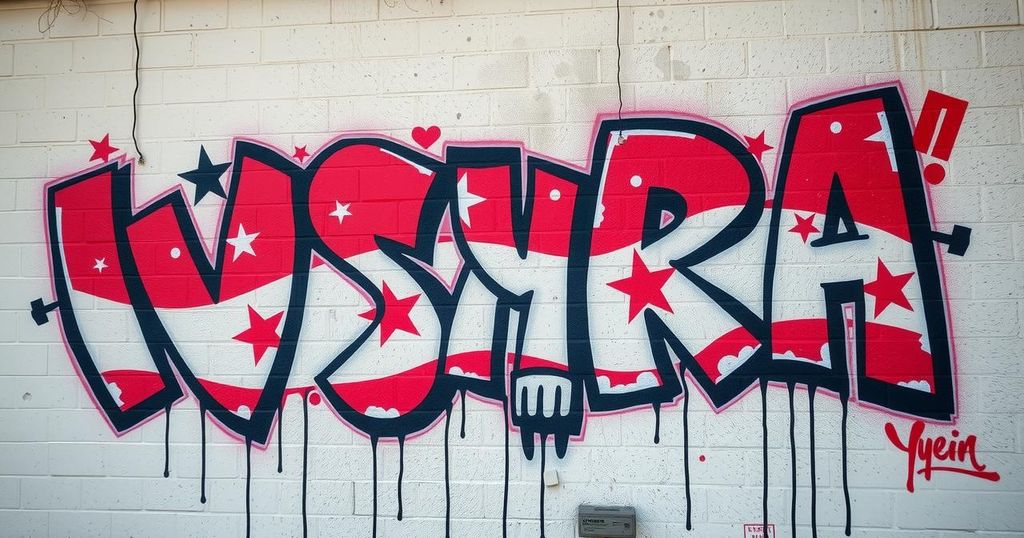The Spark of Revolution: How a Teen’s Graffiti Ignited Syria’s Civil War
Mouawiya Syasneh’s graffiti in 2011 sparked the Syrian revolution against Bashar al-Assad, leading to a brutal civil war that has claimed over half a million lives and displaced millions. The uprising initially inspired by calls for freedom became complicated by extremist groups and severe repression. Assad’s recent retreat to Russia signifies a potential turning point as rebel forces gain control, raising questions about Syria’s future.
In 2011, the Syrian Civil War was ignited by the graffiti of a 14-year-old boy named Mouawiya Syasneh, who inscribed the words “Ejak el door, ya doctor” on a school wall in Daraa. This phrase, which translates to “It’s your turn, Doctor,” was a direct challenge to President Bashar al-Assad, whose oppressive regime stifled dissidence and discontent among the populace. Mouawiya’s act of rebellion, although small, symbolized the growing unrest in a nation plagued by decades of authoritarian rule.
Upon their arrest by the Mukhabarat, Syria’s secret police, Mouawiya and his friends faced severe torture and humiliation. The regime’s violent response to public outcry for their release only fueled further dissent. On March 15, 2011, Syrians organized the Day of Rage in solidarity with the Arab Spring, demanding freedom and justice, which quickly escalated as peaceful protests turned into fierce clashes with government forces. Resistance against the regime gathered momentum, leading to the formation of the Free Syrian Army as military defectors sought to oppose al-Assad’s brutal tactics.
As the conflict continued, extremist entities such as ISIS and Jabhat al-Nusra exploited the situation, resulting in a fragmented opposition against a regime that responded to all challenges with escalating violence. Over a decade later, the human cost of this revolution is substantial, with over half a million lives lost and millions displaced, while cities continue to lie in ruins.
In a striking turn, rebel forces, now led by Hayat Tahrir al-Sham, have reclaimed significant territories in Syria, including parts of the capital, Damascus. Reports indicate that Bashar al-Assad, once seen as untouchable, has retreated to Russia amid the changing tides of power. The initial act of graffiti by a teenager has thus unfolded into a profound narrative about resistance, repression, and the tragic cyclical nature of conflict, compelling observers to ponder the future of a beleaguered nation seeking redemption and stability.
The Syrian Civil War represents one of the most significant humanitarian crises in contemporary history, arising from a series of protests against authoritarian rule by President Bashar al-Assad. Rooted in growing discontent and driven by the inspiration of the Arab Spring, these initial protests were met with extreme violence imposing casualties and widespread devastation across the country. The conflict has since drawn in various factions, including militarized opposition groups and extremist organizations, highlighting the complexities of civil unrest in a repressive state. This backdrop is underscored by the impactful act of graffiti by Mouawiya Syasneh, symbolizing the spirit of rebellion that catalyzed the broader uprising.
In conclusion, the rebellious act of a young teenager, Mouawiya Syasneh, catalyzed an uprising that not only challenged the Assad regime but also spiraled into one of the most devastating civil wars in history. The situation in Syria serves as a chilling reminder of the consequences of oppression and the resilience of the human spirit in the face of tyranny. The current developments indicate a significant shift in power dynamics, leaving the future of Syria uncertain as the nation grapples with the remnants of its tragic past.
Original Source: www.indiatoday.in




Post Comment